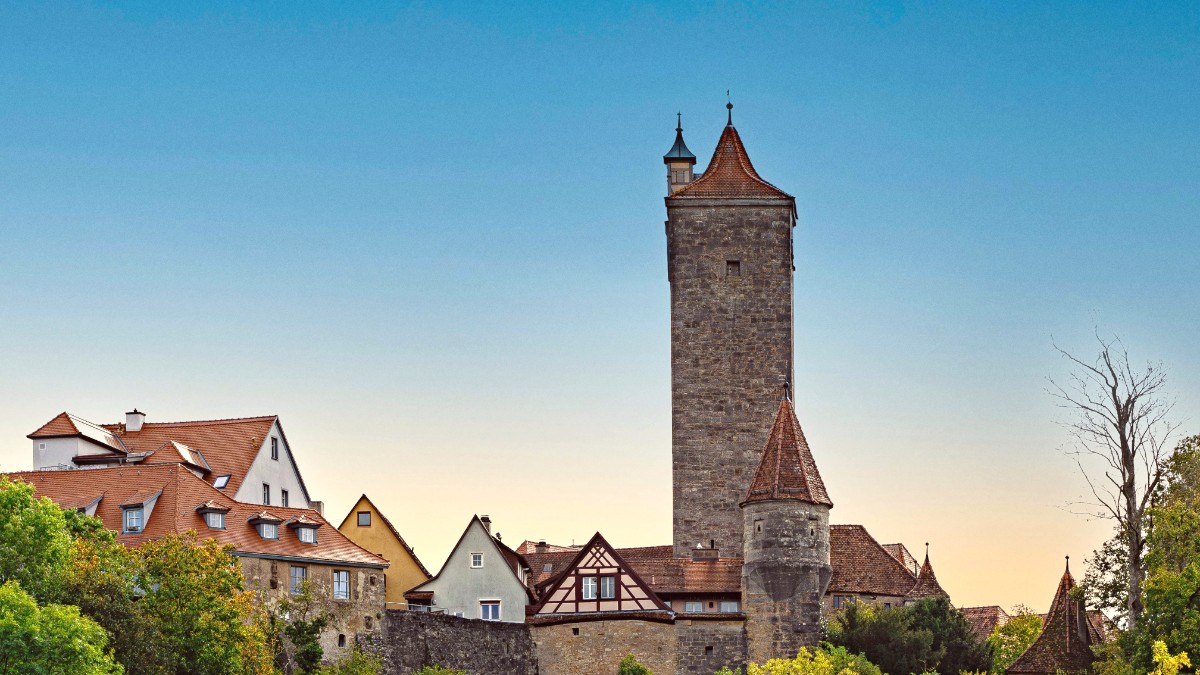
Bavaria, Germany
Rothenburg ob der Tauber experiences a temperate continental climate, marked by four distinct seasons. Each period brings its own character and options for visitors.
The climate details assist in packing and activity planning.
Each season brings distinct advantages and disadvantages for visiting Rothenburg ob der Tauber. Consider these points when planning your trip:
High season brings warm weather and full operation of attractions, but also crowds and higher prices. Shoulder seasons offer pleasant weather and fewer crowds, with better value. Low season means fewer visitors and lower costs, but colder weather and shorter daylight hours.
June-August; December (Christmas Market)
Warm, sunny weather; all attractions open, lively atmosphere.
Busiest times, large crowds, peak prices for accommodation and flights.
April-May; September-October
Pleasant weather, smaller crowds, lower prices, beautiful scenery.
Some smaller shops might have reduced hours, chance of cooler temps or rain.
November (excluding Christmas Market); January-March
Fewest crowds, budget-friendly prices, magical snowy landscape.
Cold weather, shorter daylight, some establishments might close for winter.
Rothenburg ob der Tauber does not experience monsoons or hurricanes. Extreme temperatures, like prolonged periods below -10°C (14°F) or above 30°C (86°F), are possible but do not occur often. Summer heatwaves can happen, making sightseeing uncomfortable during midday; plan to explore in the mornings or evenings on such days. Winter months consistently stay below freezing, with ice and snow common, making careful footing necessary on cobblestones.
For walking the Town Wall or exploring the Old Town, Spring (April-May) and Autumn (September-October) have pleasant temperatures, fewer crowds, and beautiful scenery. Summer mornings also are good before the main crowds. Visiting the Christmas Market (Reiterlesmarkt) occurs late November through December 23rd. Hiking or Cycling in the Tauber Valley happens best Late Spring to early Autumn (May-September). Museum visits are good year-round, as they are an excellent indoor option during colder or wetter low season days.
Spring & Autumn, or Summer mornings.
Late November to December 23rd.
May-September for hiking/cycling.
Anytime, great for cold or wet days.
Watch for summer heatwaves, prepare for winter ice/snow.
Travel to Germany, including Rothenburg ob der Tauber, calls for adherence to specific entry regulations. Germany is part of the Schengen Area, a group of 27 European countries that have abolished passport and other border control at their mutual borders.
Citizens of many countries, including the United States, Canada, Australia, New Zealand, Japan, South Korea, and the United Kingdom, do not need a visa for stays up to 90 days within any 180-day period. This allowance covers tourism or business purposes within the entire Schengen Area. These travelers enter under a visa waiver program. Starting in mid-2025, travelers from visa-exempt countries will need to obtain an ETIAS (European Travel Information and Authorization System) authorization before their trip. This is not a visa but a pre-travel authorization, similar to the ESTA in the United States.
Citizens of countries not covered by the Schengen visa waiver program must apply for a Schengen visa (Type C short-stay visa) at the German embassy or consulate in their home country. This application process must occur before travel. Processing times can vary, so allow ample time, typically several weeks, before your planned departure date.
Germany uses the Euro (€) as its currency.
Estimated daily costs for different travel preferences. Prices can change based on season and booking time.
Germany has a high-quality healthcare system.
No specific vaccinations are needed for entry.
Ensure MMR, DTP, Polio, and annual Flu shot are current.
Seasonal allergies, colds/flu, tick-borne diseases (rural areas), sunburn, blisters.
Emergency Number: Dial 112 for all emergencies (ambulance, fire, police) throughout Europe.
Rothenburg ob der Tauber has local general practitioners (Ärzte) and pharmacies (Apotheken) for minor ailments or prescription refills. Pharmacies in Germany are well-regulated. For serious medical emergencies, transfer to larger hospitals in nearby cities like Ansbach or Nuremberg may occur.
Have your travel insurance information readily available, including policy number and emergency contact details for your insurer. This speeds up any necessary medical care or claims.
Non-emergency Police: 110. Medical advice (non-emergency, doctor on call): 116117.
Tap water in Rothenburg ob der Tauber and throughout Germany is safe to drink. It meets high European standards. Refill your reusable water bottle from the tap.
Germany maintains very high food safety standards in restaurants, cafes, and markets. Eat with confidence from street vendors, bakeries, and fine dining establishments.
Enjoy local culinary offerings without hygiene concerns.
Rothenburg ob der Tauber is a very safe town. Violent crime is rare.
Germany has a low risk of major natural disasters. Occasional severe thunderstorms can occur in summer, sometimes bringing heavy rain or hail. Winter can bring snow and ice, which may affect travel conditions but rarely pose severe risks. Pay attention to local weather forecasts during your visit.